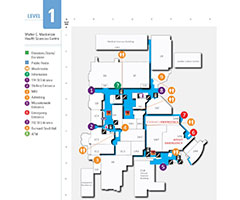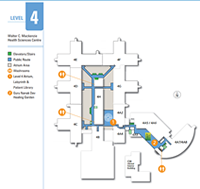

Weeks Before Surgery | Day Before Surgery | Day of Surgery
Your child needs surgery. Now what? Coming to the Stollery Children’s Hospital for surgery is a big event for you, your child, and your family. Getting ready and thinking clearly can seem almost impossible at this time. Take the time to talk together before coming. Knowing what to expect and how to prepare ahead of time will help to decrease anxiety for both you and your child.
If your child is coming to the Stollery for heart surgery, visit Your Child’s Heart Surgery.
While you wait for your child’s surgery date, there are some important things to do to prepare and information you will need to know.
Designated Family/Support Persons are welcome on the day of surgery; however, we suggest having siblings and other children in your care stay with family or friends.
At least one parent needs to be with your child on the day of surgery. Ask the surgeon how long your child will be in the hospital and how long he or she needs to stay home to recover. This will help you plan for any days off work.
Let your child's teacher(s) know how long your child will be away from school to help plan for any missed schoolwork. If your child is well enough during their hospital stay they can attend the Stollery School.
Talking to your child or teenager about their surgery is important. They will feel less anxious if they know what to expect. If you need more help with how to get your child or teenager ready for their surgery contact a Stollery Child Life Specialist at stollery.childlife@ahs.ca or 780-407-6818.To learn more, visit the Stollery Child Life Program.
If you are from out of town and need a place to stay there are accommodations near Stollery Hospital.
If there is any change to your phone number before your child’s surgery, contact the Stollery Surgical Booking Office at 780-407-8398 and provide them with your new contact information, including your email address.
Be prepared, have over the counter pain medicine like Tylenol®, Tempra®, Advil® or Motrin® ready at home. If you would like generic brands for these medications ask a pharmacist for assistance. If you have questions about pain medications talk to your pharmacist. Stock up on fluids such as soups, popsicles, juices and solid foods that are easy to digest.
The hospital will contact you during the day before surgery to tell you:
Make a list of all the medicine your child takes and bring the medications in their original containers with you. This includes over the-counter medicines like vitamins and herbal supplements. If you need help with the list, you can ask your pharmacy for a printout or use Medication Lists and Tools to keep track of your child’s medicine.
Viewing the parking map to help plan on where to park, or how to find us if using public transit. Give yourself an extra 30 minutes for parking and walking to the hospital to ensure you arrive at the Stollery on time. See also transportation home.
Shampoo their hair. Braid long hair or tie it back in a ponytail. If you were asked to use special soap use it. Otherwise, use your child’s regular soap and shampoo.
If your child has a fever, or flu-like symptoms call:
Ensure that:
Children having day surgery and surgeries that require a hospital stay of one night or less can go to 1A1 Surgical Short Stay for patient registration.
Children having surgery that need a hospital stay of longer than one night can go to 1C3 Pre-Admission Clinics (PAC) directly.
Your child will:
The anesthesiologist will visit you and your child before they go into the OR. One parent may be invited into the operating room to assist with keeping your child calm as they go off to sleep. Attendance in the OR is at the sole discretion of the anesthetist and can be discussed with them when they talk to you before the operation. If you are invited into the OR, you will be asked to wear a hat over your hair and a gown over your clothes to prevent outside germs from coming into the clean environment of the operating room. You will not be able to stay in the OR for the procedure and will be asked to leave once your child is asleep. Please note cellphones and other recording devices are not permitted in the operating room
While your child is having their surgery, you will be holding all of your child’s and your own personal belongings. On the day of surgery, bring only what you and your child need for the first 24 hours, and only what you can carry. You can bring the rest once settled in your room after surgery.
Your Day Ward / PAC nurse or surgeon will tell you how long the surgery might take. The length of time that a child will be in the OR is sometimes difficult to estimate. The teams in Day Ward / PAC and the OR will make sure that you know the plan for receiving updates while your child is in the OR. When the surgery is done, the surgeon will come and meet with you at a designated location to discuss how the surgery went and how your child is doing. Before leaving the Day Ward / PAC, make sure your cell phone number is up-to-date in your child’s chart.
After surgery, your child will go to the Post Anesthetic Care Unit (PACU) where they will wake up from the general anesthesia. The PACU is also called the recovery room or wake-up room
Your child will stay on this unit until it is safe for them to be moved to a nursing unit. Your child’s nurse will tell you when your child is ready to be moved out of PACU.
If your child is expected to go home the same day as their surgery, they will be moved to the Day Surgery area, located within the Surgical Short Stay Unit 1A1/1A2. Your child will spend at least 1 hour on the Short Stay unit after surgery but some children may need to stay longer. Your child will be able to leave the hospital once they can keep fluids down and their pain is controlled by pain medicine given by mouth.
For children who will be staying at the Stollery for more than one night, your child will be transferred from PACU to the 4D Pediatric Surgery Inpatient Unit.
We may teach you and your child to do exercises that will help them recover more quickly after surgery. We will ask your child to do these exercises until they go home. Remind your child to do the exercises and let them know how well they are doing as they do the exercises. Talk to your child’s nurse if you have questions or concerns about the exercises.
Learn more about exercises after surgery, including deep breathing, coughing, and moving on MyHealth.Alberta.ca. You can have your child practice these exercises at home before surgery.
Your child may be sleepy or a bit uncomfortable on the drive home. You may find it helpful to have 2 adults for the drive so one can take care of your child.
If you usually travel by bus, ask a friend or family member to drive you home. The hospital staff can also help you arrange a taxi, if you need one.
In case of vomiting, have a sealable container or plastic bag and tissues for the ride home.
Before you leave the hospital, your child’s healthcare team will tell you how to care for your child after surgery. We encourage you to ask questions about your child’s care during their hospital stay.
For general information on how to take care for your child after you leave the hospital, search patient care handouts on MyHealth.Alberta.ca for your child’s surgery or procedure.
Surgery & Operative Services Program
MyHealth.Alberta.ca
Your Child's Surgery
Jump to:
Videos
1st Floor
Includes Pre-Admission Clinics

4th Floor
Includes Unit 4C
